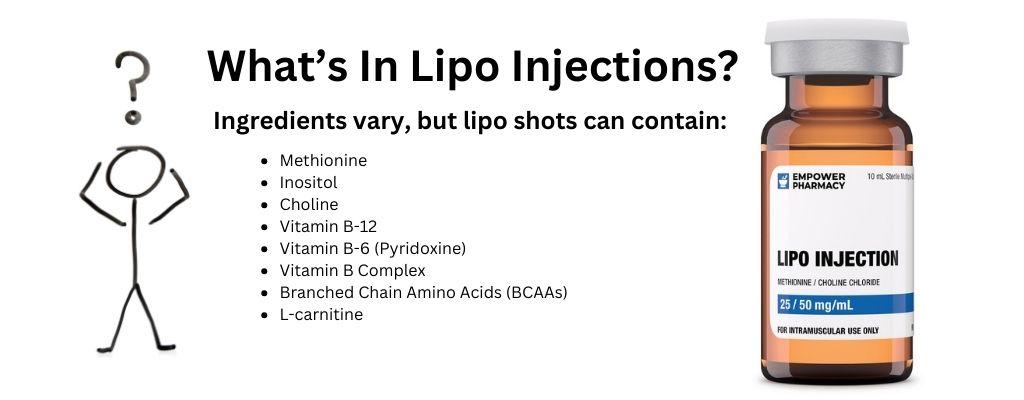Have you ever felt overwhelmed by the myriad of weight loss options out there, especially when it comes to the growing popularity of weight loss injections? You’re not alone—many people are searching for effective solutions but are also left wondering about the safety and long-term effects of these treatments. In this article, we’ll dive into the essential facts about weight loss injections, explore their potential benefits and risks, and provide you with the insights you need to make an informed decision. Whether you’re curious about how they work or just want to understand the safety concerns, we’ve got you covered. So, grab a cup of your favorite drink and join us as we unpack this important topic together!
Are Weight Loss Injections Safe for Everyone
When diving into the world of weight loss injections, one might wonder if they’re truly a golden ticket to shedding pounds or just another fleeting fad. While many individuals have reported success stories, it’s vital to remember that weight loss isn’t a one-size-fits-all approach. Certain injections, like those that utilize peptides or hormones, can be beneficial; however, they also carry risks and potential side effects. Have you ever considered how your personal health history or pre-existing conditions might influence the efficacy of these injections? For instance, individuals with a history of metabolic issues or hormone sensitivity should tread carefully. It’s crucial to consult with a healthcare professional who understands your unique profile before making any decisions.
Moreover, societal pressures often distort our perceptions of safety and efficacy. Many assume that if a treatment is available, it must be safe for everyone. Yet, that’s not always the case. For example, those with certain allergies or conditions such as diabetes may experience adverse reactions or complications. According to a study published in the blank”>National Institutes of Health, some weight loss medications can lead to significant health concerns if not appropriately managed. Think of weight loss injections like a double-edged sword—the right dosage and monitoring can help achieve desired results, but misuse or lack of guidance can lead to problems that far outweigh the benefits.
If you’re considering these injections, take a moment to reflect: what are your weight loss goals? Are they realistic and sustainable? Remember, weight loss success often comes from a combination of diet, exercise, and mental well-being, not just a quick fix. Here are a few steps to keep in mind:
- Do your research: Understand the ingredients and mechanisms behind the injections you’re considering.
- Consult with professionals: Seek advice from a healthcare provider who can offer personalized insights.
- Stay informed: Regularly check credible sources, like the blank”>CDC, for the latest information on weight management and safety.
By integrating these steps into your process, you won’t just be chasing numbers on a scale; you’ll be fostering a holistic approach to health that prioritizes your well-being above all else.

Understanding the Ingredients in Weight Loss Injections
When you think about weight loss injections, what’s the first thing that comes to mind? Maybe it’s a magic solution—something that promises to melt away those stubborn pounds effortlessly. However, when exploring the actual ingredients in these injections, the reality may surprise you. For starters, many of these products contain hormone-like compounds, such as GLP-1 analogs like semaglutide. This particular ingredient isn’t just a random pharmaceutical cocktail; it’s derived from a hormone that regulates appetite and insulin secretion. Understanding how these ingredients work with your body prompts questions like, “How do these hormones interact with my metabolism?” and “Could I be affecting my body’s natural processes in ways I don’t fully understand?”
Another common component found in these injections is lipotropic agents. These compounds, such as methionine, inositol, and choline, are often touted as fat burners. By supporting the liver’s function and aiding in fat metabolism, they offer a mechanism for weight loss beyond appetite suppression. But here’s the thing: while they can be effective, the benefits might vary significantly from person to person. Imagine swapping experiences with someone who had success and someone who didn’t. What accounted for their differing results? Personal biology, lifestyle choices, and adherence to a healthy regimen all play pivotal roles, making it essential to consult with healthcare professionals to tailor an approach that fits your unique situation.
we can’t overlook the psychological aspect of weight loss injections. Often, there exists a babble around the efficacy of injections versus lifestyle changes. In fact, the real key may not lie solely in the injection itself, but rather in the mindset shifts it encourages. Are you prepared to embrace healthier eating habits or incorporate regular exercise into your routine? Research shows that sustainable weight loss tends to happen when injections are paired with lifestyle adjustments—a concept supported by studies from credible health organizations like the CDC. the journey to weight loss is complex, and understanding the ingredients is just the beginning of unraveling how they fit into your broader journey.

Potential Side Effects of Weight Loss Injections
When considering weight loss injections, it’s crucial to weigh not just the benefits, but also the potential side effects that can arise from their use. Many people might have heard stories of miraculous results, but what about the not-so-glamorous realities? Side effects can range from mild discomfort to more serious health concerns. Common issues include nausea, diarrhea, and fatigue, typical responses to any medication that alters your bodily functions. Have you thought about how these could disrupt your daily life? For instance, imagine planning your week, only to be sidelined by gastrointestinal distress—definitely not the “weight-loss miracle” you signed up for.
Then there’s the psychological aspect to consider. It’s fascinating how the mind and body are interconnected; stress can exacerbate side effects, leading to increased anxiety or mood swings. Some users have reported feelings of increased irritability or emotional fluctuations due to hormonal changes induced by these injections. Have you ever found yourself on an emotional rollercoaster after a big life change? It’s worth reflecting on how your emotional landscape might shift during this transformation. Remember, not every experience will be the same, but understanding the possibility can prepare you for what might lie ahead.
Lastly, the rarer but more severe side effects deserve attention. Some people have experienced allergic reactions, or even more alarming, pancreatitis and kidney problems. It’s essential to consult with your healthcare provider and discuss your entire medical history before starting any new treatment, including weight loss injections. They can help you assess the risks based on your individual circumstances. To dive deeper, I recommend checking out resources like the National Institutes of Health or the Food and Drug Administration for evidence-based data. Empower yourself with knowledge—your journey to wellness should be informed, balanced, and tailored to you.

Consulting Healthcare Professionals about Weight Loss Injections
When it comes to weight loss injections, consulting healthcare professionals is crucial. You might be enticed by the latest commercial promising quick results, but have you thought about how these injections work? For instance, many of these products, like GLP-1 agonists, are designed to regulate your appetite and enhance feelings of fullness. However, the science behind them can be complex, and individual reactions can vary widely. Engaging in an open dialogue with a healthcare provider not only helps you grasp the mechanism of action behind the injections but also enables you to navigate potential risks and side effects tailored to your specific health history.
Consider the stories of individuals who’ve made choices based on trends rather than insight. One friend of mine jumped on the bandwagon of a popular weight-loss injection without fully understanding its impact on her blood sugar levels. After discussing her decision with her physician, she learned that the injection could exacerbate her pre-existing condition. Consulting a healthcare professional can prevent such scenarios. They can provide assessments based on your unique circumstances, making a significant difference in your journey—be it through the prescription of these injections or recommending safer, more sustainable alternatives.
Furthermore, trustworthy sources of information can transform your perspective. Websites like the blank”>CDC and blank”>National Institutes of Health offer insights into weight management and the complexities surrounding medical interventions for weight loss. Take time to educate yourself, and always ask critical questions during consultations. How effective are these injections in the long term? What lifestyle changes complement their use? Addressing such inquiries not only clarifies your understanding but empowers you to make informed decisions that could lead to lasting change, all while maintaining your health and well-being.

Best Practices for Using Weight Loss Injections Safely
When diving into the world of weight loss injections, it’s vital to approach them with a mindset rooted in safety and informed decision-making. Consult with a healthcare professional before you start. This isn’t just a formality; it’s your opportunity to discuss your medical history, current medications, and any potential allergies. Think of this initial consultation as your safety net, ensuring that the injections align with your personal health goals. According to the Centers for Disease Control and Prevention (CDC), understanding your unique health profile can greatly affect the effectiveness and safety of any weight loss method you choose. CDC
Next, consider sticking to reputable brands and understanding what’s in your injection. Not all products are created equal, just like not all weight loss stories are the same. Some might share success with a particular brand or formula, but that doesn’t mean it’s right for you. Research and select injections that are FDA-approved, as this adds a layer of assurance regarding their safety and efficacy. Reviews and testimonials can provide insights, but always weigh them against clinical evidence. After all, believing in the legitimacy of your chosen product can bolster your confidence on your weight loss journey.
Lastly, pay attention to the administration process. If you’re doing self-administered injections, practice proper techniques—this isn’t the time to wing it! Ensure you follow guidelines for dosage, storage, and hygienic practices. Keep in mind that even minor mistakes can lead to complications. Joining forums or support groups can offer guidance, but remember that seeking advice from a professional should always be your first step. Studies have shown that a combination of proper technique and peer support can ultimately lead to more sustainable weight loss results. So, take a moment to reflect: are you ready to embark on this journey with the right information and habits, ensuring your well-being every step of the way?
What This Means for You
As we’ve explored, the world of weight loss injections is both complex and nuanced, raising important questions about safety and efficacy. While these treatments may offer promising results for some, it’s essential to weigh the potential benefits against the risks and to come prepared with as much information as possible. If you’re considering this route, it’s wise to consult with a healthcare professional who can guide you based on your unique health situation. Reflecting on your own weight loss journey, what strategies have you found most effective? Sharing your experiences can not only foster community support but also empower others on similar paths. Remember, achieving your health goals is a personal journey that celebrates progress, no matter how small. So, stay informed, trust yourself, and embrace the steps you take toward a healthier future.





